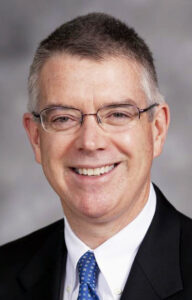By Dr. Tim Millea
Catholic Health Care Today

Over the past several weeks, the Diocese of Davenport has seen significant attention to sexual and gender-related issues. On Oct. 4, then-Archbishop-Bishop Zinkula issued the diocesan “Guidelines for Pastoral Accompaniment of Sexual and Gender Minorities.” Shortly after, at the St. Thomas Aquinas CMA Guild White Mass on Oct. 21, Father Tad Pacholczyk, senior ethicist at the National Catholic Bioethics Center, provided a presentation on “The Ethics of the Transgender Question,” detailed in The Catholic Messenger. One point was clear to everyone in the audience. Gender-related issues require our attention. Our diocese is no different from any other in America. When important and often controversial issues arise, they must be addressed.
In the realm of gender issues, open and honest dialogue is required on multiple fronts. This column focuses on the medical aspects of these considerations and particularly on the paramount importance of the individual seeking care. First, we must consider a basic question, namely, what are the goals of medical care? In general, the basic intentions in medicine are prevention of disease, relief of suffering and care of the sick. A review of the medical literature related to gender issues raises many questions about achieving these goals.
The American Psychiatric Association defines gender dysphoria as “psychological distress.” If that constitutes a disease, how can it be prevented? If it is a psychological entity, why is treatment with medication and surgery recommended? Mental health issues warrant counseling as the most basic intervention, especially with younger individuals. Yet many cities and states have instituted a ban on such counseling, misrepresented as “conversion therapy.” Studies demonstrate that 75-95% of gender dysphoric prepubertal children will fully adopt their biological sex when neither affirmed nor medicated. Is medical or surgical treatment justified when the vast majority of children and teens will ultimately lead normal lives without any of these methods?
One of the tenets of the supporters of these interventions is that it will prevent suicide by relieving the suffering of the individual. It is true that those individuals have a higher incidence of suicide, approximately three times greater than the general population. However, if a full transition is accomplished, studies that follow individuals long-term reveal disturbing findings. Researchers at the Karolinska Institute in Stockholm studied all persons who fully transitioned in Sweden from 1973 to 2003, with at least 10 years follow-up for each one. When compared to the general population, the completed suicide rate in all persons who fully transitioned was more than 19 times higher. Particularly dramatic was the completed suicide rate in those who transitioned from female to male, which was 40 times higher. Given these and similar findings in other research, it seems reasonable to question whether these transition interventions alleviate suffering.
A basic tenet of caring for the sick is to provide treatment beneficial to the patient and with a low level of risk. In addition, the support of evidence-based research is necessary to provide confidence to the clinician and the patient that the best treatment is administered. Such reassurances are lacking in gender care medicine. With the use of puberty blockers and cross-sex hormones, children and adolescents develop abnormal bone density, a slowing of brain maturation and risk life-long sterility. Whether testosterone is given to young girls or estrogen to young boys, a litany of medical problems can arise, including liver toxicity, insulin resistance, blood clots, high blood pressure and breast cancer. The complications following surgical transition were equally striking. Surgeons at Hahnemann University Hospital in Philadelphia in 2018 reported a complication rate of more than 32% for male-to-female transitions. The data is more worrisome for female-to-male surgeries. In 2020, surgeons at the University of Amsterdam reported that additional surgery was required in 73% of their patients. With data like these, is it true that the benefits outweigh the risks of these interventions? Is something being done to the patient, and not for the patient?
As a result of the studies demonstrating lack of evidence to support these interventions as well as the harms imparted by them, many countries have limited or abandoned these methods, including Sweden, Norway, Finland, the United Kingdom, France, Belgium, Italy, Denmark, Australia and New Zealand. Notably absent is the United States, where organizations such as the American Academy of Pediatrics continue to support and promote these methods. Researchers that try to publish studies calling these methods into question find their submissions rejected. This lack of balance in opposing viewpoints does not advance the role of science in medicine. Open discussions and debates are necessary. When only half of the information is allowed, we can never understand the whole truth.
As discussed in the diocesan guidelines, a Catholic, pastoral approach is essential in accompanying people who experience differences in sexual orientation or gender discordance. Each one is a child of God who deserves respect for their inherent dignity and worth. We are called to bring the love of Christ to each of them. It is increasingly evident that the harms incurred with gender-related interventions are being recognized and the purported benefits are not realized. The truth in difficult situations can be painful to someone in need but the truth is necessary. To love our neighbor includes the responsibility to tell them what is true and what is false, what is good and what is harmful. That is a mark of a caring Christian. In spite of the controversies and emotional upheaval in many issues, every person deserves to be told the truth by those who love them.
(Dr. Tim Millea is president of the St. Thomas Aquinas Medical Guild and a member of St. Paul the Apostle Parish in Davenport.)











